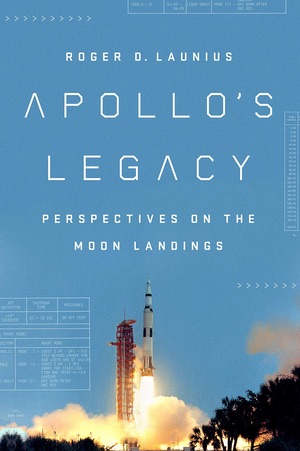Review: Apollo’s Legacyby Jeff Foust
|
| The Apollo missions provided excellent science, but that didn’t mean all scientists of the era were happy about it: Launius quotes one unidentified scientist who quipped, “We were manned if we did, and manned if we didn’t.” |
“Most remembrances of the landings have been dominated by a celebratory perspective,” Launius notes in the book’s prologue, which he terms a “triumphalism” viewpoint. That perspective, though, often overlooks counternarratives from different perspectives, he argues: criticism from the left that Apollo was a waste of money that should have been spent on social programs, criticism from the right that Apollo was a waste of money that should not have been spent at all, and a “fringe perspective” that harbors conspiracy theories, including the belief that the Moons landings didn’t take place.
Launius uses those different lenses to look at various aspects of Apollo throughout the book (the fringe perspective is largely contained to a chapter near the end of the book that examines the long-running, but potentially growing, belief that the landings were an elaborate hoax.) These range from the political arguments for the program to the public perceptions of NASA astronauts to preserving the history of the program.
An example is the chapter on the science of the Apollo missions. Most recognize that the Apollo missions were done for primarily geopolitical, not scientific, reasons, but that scientists were willing to go along with them because of the benefits of having explorers on the lunar surface. In fact, many scientists on both the left and the right objected to Apollo, arguing the cost was not worth the benefit or that it “lassoed science into the service of the state.” The missions, of course, did perform excellent science, including returning samples that are being studied to this day, but that didn’t mean all scientists of the era were happy about it: Launius quotes one unidentified scientist who concluded, “We were manned if we did, and manned if we didn’t.”
Those alternative perspectives are important, he argues in the book’s concluding chapter, amid calls for yet another attempt to return to the Moon. “In part to advance the dominant narrative of Apollo as an American triumph,” he writes, along with other political reasons, “several presidents and their political allies have advocated for a return to the Moon.” Two previous efforts, the Space Exploration Initiative and the Vision for Space Exploration, failed, and Launius notes that this dominant narrative meant that advocates overlooked the fact that, even during the Apollo program, public support was not nearly as widespread as people now believe.
A third effort to return to the Moon is underway by the Trump Administration, but Launius is not optimistic it will be any more successful than the previous two. “Returning to the Moon certainly will not happen again anytime soon without a major realignment of rationales, needs, and priorities,” he concludes. “In 100 years, Apollo may be remembered as a singular event, glorious and revered but viewed increasingly as an undertaking without lasting significance.” That complex, critical perspective makes Apollo’s Legacy stand out amid all the books that simply celebrate that glorious and revered event.
Note: we are temporarily moderating all comments subcommitted to deal with a surge in spam.
